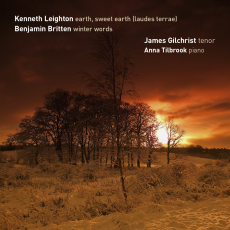James Gilchrist - Leighton & Britten - International Record Review
Here are two profoundly beautiful twentieth-century English song-cycles performed by James Gilchrist and Anna Tillbrook. The two works are very closely related musically - indeed, there are passages in the Leighton, which, possibly because Britten's style is generally more familiar to us, sound very Brittenesque indeed- as well as historically, the Leighton having been written in 1986 as a memorial to Peter Pears. (The booklet notes describe Pears as Britten's ‘lifelong partner'; not the only incorrect or unjustified claim to be found here.)
Commissioned by tenor Neil Mackie, Earth, sweet earth...(Laudes Terrae) is more suited to a lighter, less heady, more ringingly melodious voice than Pears's robust yet unquestionably musical delivery and, as such, Gilchrist would seem an ideal performer. Certainly, he exudes a great feeling of involvement in the music only at the climaxes (and there are, it has to be said, rather a lot of those) does one wish for a little more vocal weight. He has the ability to sustain and shape Leighton's long musical lines with an innate naturalness which glides easily over the often very chromatic language. The overall effect is of expressiveness and lyricism, perfectly mirroring the texts, which Leighton drew from two English writers of the Victorian age, Ruskin and Gerard Manley Hopkins.
Perhaps most impressive of all in this performance is Tilbrook's profoundly sensitive piano playing. She is a perfectly poised partner to Gilchrist's vocal intensity. It is to the piano that Leighton devotes the weight of his trademark devices - extended crescendos built over sequences of seconds and tantalizing unresolved dissonances stretching over many bars - and Tilbrook delivers these with a mixture of disarming delicacy and, just very occasionally, real power. The essence of Leighton's self-styled ‘Solo Cantata' is of subtle expression rather than blatant emotion, and Tilbrook conveys this aspect of the music most effectively.
The Britten song-cycle seems particularly to suit Gilchrist's special blend of flowing lyricism and forward delivery of texts - always here, and in the Leighton, delivered with utter unforced clarity. While it is sometimes difficult for those of us of a certain age ever to hear this music without feeling the ghost of Pears peering over the loudspeakers, Gilchrist is sufficiently his own man to put a stamp of individuality on those songs, which doesn't seek to evoke the Pears style yet still sounds totally right for this music. Winter Words dates from 1953 and is one of Britten's more austere vocal works. The booklet notes refer to close relationships here with Schubert's Winterreise, which, apparently, Britten and Pears were busily performing at the time of the work's composition. While that is a fairly obvious parallel, the idiom as revealed in this recording is rather more desolate and austere. This is very much an East Anglian winter as opposed to the Dorset one evoked by Thomas Hardy's words. Again it is Tilbrook who provides some of the most enchanting moments as she relishes Britten's splashes of descriptive colour in the piano writing: there's a delightful wagtail chirping in ‘Wagtail and Baby', a sonorous organ-like hymn melody underlying ‘The Choirmaster's Burial' and, most famously, a dancing fiddle in ‘At the Railway Station, Upway'. It has to be said that while Gilchrist is pretty near faultless in his interpretations of these songs, it is the piano playing which elevates these performances.
For the Britten, I still much prefer Anthony Rolfe Johnson and Graham Johnson on Hyperion, but Gilchrist and Tilbrook offer a very fine alternative, entirely idiomatic and perfectly gauged in terms of scale. However, the Leighton is such a fine and - at around 40 minutes - monumental work, that no lover of twentieth-century English song should be without it. As such, this disc, superbly recorded at Christ's Hospital, Horsham, is an essential part of any collection.


